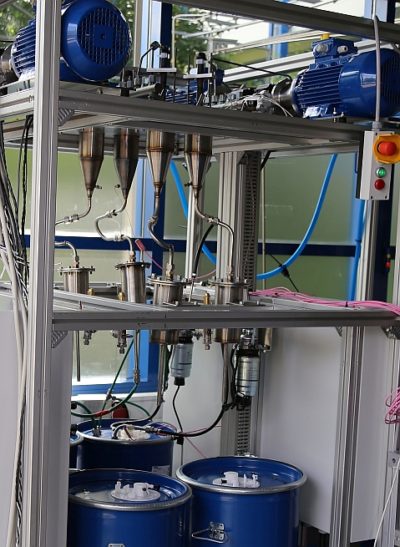Fuel and Component Testing

HiL test bench for the qualification of fuels, additives, materials and components. Photo: Tec4Fuels
A core competence of Tec4Fuels is the development and implementation of suitable test methods for the qualification of fuels, additives, materials and components. This also includes consulting services concerning the use of conventional and alternative (synthetic and biogenic) fuels in existing and newly developed application technologies. With its test methods, Tec4Fuels makes an important contribution to optimising the storage stability and usability of liquid fuels as well as the operational safety and service life of components and systems. Tec4Fuels customers include companies from the automotive industry and its suppliers, heating and turbine manufacturers as well as manufacturers and operators of thermoprocessing plants. Their aim is to develop new parts/components in harmony with the use of an increasing range of fuels, such as light fuel oil, petrol and diesel, and blends with alternative fuels.
Hardware in the Loop test methods for fuels and components
Research is currently being conducted into the production of synthetic fuels (so-called e-fuels) with a high greenhouse gas reduction potential to ensure a climate- and environmentally friendly energy supply. These are fuels such as oxymethylene ether (OME), dimethylene ether (DME), methanol, methanol-to-gasoline (MtG), 1-octanol, 2-butanol or hydrogenated vegetable oils (HVO). One of the development tasks is to ensure the suitability of these new fuels in engines, heating systems and other technical systems that are currently available and under development. Fuel diversification, the use of new raw materials for production and the continuous further development of application technology and the materials used require ongoing fit-for-purpose tests. For this purpose, Tec4Fuels offers special test procedures and test rigs with which possible interactions between new fuels (and blends with them) and application technologies can be investigated and determined. Tec4Fuels uses its own hardware-in-the-loop test benches, which, for example, contain complete common rail systems from engines, to identify possible interactions between fuels and technical components – without (engine) combustion.
Benchmarks for fuels, additives and components
The test procedures enable benchmarks to be set for different fuels, fuel blends and additives as well as technical components such as fuel pumps, filters and fuel nozzles. In addition, the test procedures can be used to investigate the functions and processes of technical components and systems within the framework of the development of new application technologies, despite varying compositions and qualities of fuels. The investigation of interactions between fuels and lubricants (fuel-oil dilution) is also part of the test portfolio. The HiL test methods of Tec4Fuels make it possible to identify possible interactions between fuels and components after a relatively short time. Based on the test results, the chemical-physical properties of fuels and blends, for example, can then be adapted to the application technology by adding additives in order to rule out interactions. TEC4FUELS has extensive experience in the development of methods and test systems as well as in the execution of tests for the qualification of fuels, lubricants and technical components. The test systems are characterized by
- high application proximity and speed,
- automated evaluation of the measured data,
- illustration of the results in physical models,
- online recording of measurement signals,
- coupling of measurement results with analytics,
- and high validity of the results.
Below you will find a brochure on our range of services in the automotive sector.
Brochure: Technical solutions for fuels and fuel-handling components
Further information is available at:
+49 2407 55830-10 or
Testing@tec4fuels.com
